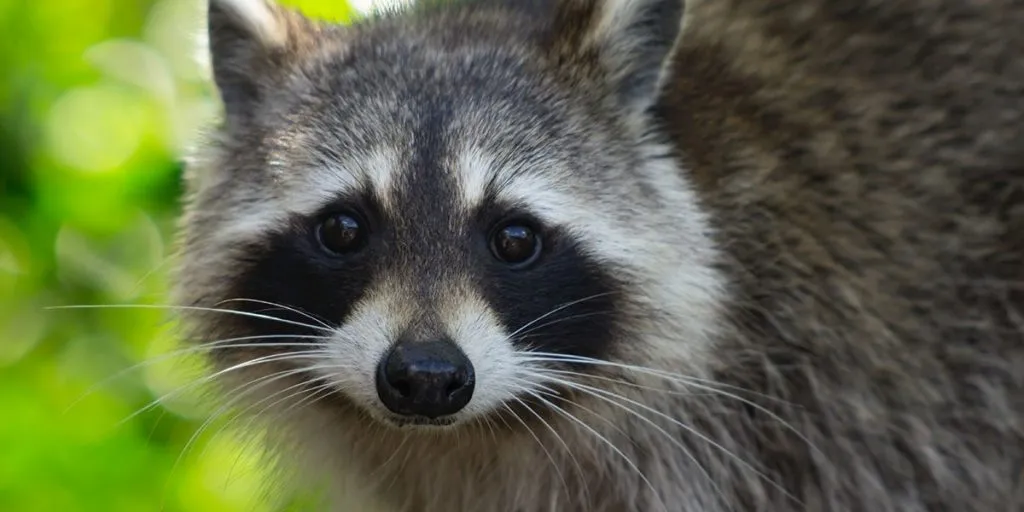Raccoons are often seen as dangerous animals due to their ability to transmit the deadly rabies virus. Along with foxes, coyotes, skunks, bats, raccoons are the primary carriers of rabies in North America.
Generally, raccoons get rabies by transmitting the virus through their saliva. This can happen either through a bite, or by interacting with the washed fur of one of their own species. It is common for a mother raccoon to transmit rabies to her young.
Another way rabies is transmitted is through feces, which is less common. However, it is possible that humans interact with raccoon poop. Since rabies is also a deadly disease for humans, it is important to wear protection while interacting with fecal matter from a raccoon. While caution is advised, the risk should not be overstated.
How Likely Is A Raccoon To Have Rabies?
According to the Center for Disease Control and Prevention (CDC), 30.3% of all wild raccoons were carriers of the rabies virus in the United States. In comparison, the population of bats carried the virus 33% of the time, skunks 20.3%, and foxes only 7.2%.
Extrapolating from CDC data, a random sample of 1000 wild raccoons would result in about 300 raccoons being active carriers of the rabies virus.
The CDC keeps track of all officially reported cases of rabies in US wildlife. They are able to confirm about 5000 cases per year. Of these rabies cases, 90% come from wild animals. Only a small part of this would involve raccoons, so you can imagine that the real reported cases are relatively low.
Are Raccoons Born With Rabies?
A mother carrying rabies is able to transmit the virus to her offspring by grooming them, but baby raccoons are not born with rabies. Newborn raccoon babies can only be carriers of the rabies virus through the saliva of a rabies-carrying mother.
Not all raccoons carrying the rabies virus will show symptoms. It is therefore possible for an entire nest to be contagious carriers of the deadly disease, without ever showing any signs.
It can be safely assumed that virus-carrying mother raccoons with babies will infect all her young by cleaning their fur with her tongue. If her babies come into contact with infected feces, it is also possible for them to catch the virus. Overall, it’s less contagious than the similar distemper virus found in raccoons.
How Long Can Raccoons Live With Rabies?
Generally, a rabid raccoon will die within 1 to 3 days after becoming infectious. This period starts whenever the animal starts showing the common symptoms of the rabies virus:
- Strange walking behavior
- Oblivious to noise or nearby movement
- Erratic wandering
- Discharge from eyes or mouth
- Repeated high-pitch vocalizations
- Self-mutilation
It must be noted that not all raccoons suffer from these symptoms after infection. An infected raccoon can also live its entire life as a contagious rabies carrier (without ever showing any symptoms).
How long a raccoon actually carries the virus through its lifetime is unclear, as asymptomatic animals can remain asymptomatic for generations. Nevertheless, if you find a rabid raccoon in the wild, it is important to take action to avoid the spread of the disease.
What To Do With A Rabid Raccoon
When encountering a raccoon showing symptoms of the rabies virus, keep your distance. Know what to do if a raccoon bites you. Immediately call your local animal control service or police department.
Clearly explain what you witnessed, and write down the location and time of the event. The professionals will then take care of the situation for you.
In the unlikely event that you got bitten or scratched by a rabid raccoon, seek medical help immediately. Also do this after coming into contact with a carcass of a rabid raccoon, infected raccoon feces, or infected fur. Even after you start showing feverish symptoms, medical help can save your life.
When you are not sure if you’re infected, get checked by a doctor anyways. It’s better to be safe than sorry, as an infection with the rabies virus is likely to kill you within several days.



